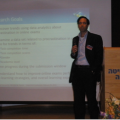NSU Newsroom
SharkBytes
Horizons
This version of NSU News has been archived as of February 28, 2019. To search through archived articles, visit nova.edu/search. To access the new version of NSU News, visit news.nova.edu.
This version of SharkBytes has been archived as of February 28, 2019. To search through archived articles, visit nova.edu/search. To access the new version of SharkBytes, visit sharkbytes.nova.edu.
Research Paper Co-Authored by GSCIS & Business School Professors Receives ‘Best Paper Award’ During Chais Conference in Israel
A paper by Yair Levy, Ph.D., associate professor at the Graduate School of Computer and Information Sciences and Michelle M. Ramim, Ph.D., part-time professor at Huizenga School of Business and Entrepreneurship, was presented during the Chais 2012 Conference on Learning Technologies Research at the Open University of Israel in Raanana, Israel. The paper was elected as one of the recipients of the Best Paper Award during the conference and will be revised for publication in the Interdisciplinary Journal of E-Learning and Learning Objects (IJELLO).
The paper, titled “Procrastination in Online Exams: What Data Analytics Can Tell US?” discusses an exploratory investigation using advanced data analytics techniques about online exams. The dataset used for this study included 1,629 online exam records over a period of five terms in an academic institution in the southeastern United States. The online exams were provided during a weeklong timeframe where students were asked to take it based on material that they studied the previous week.
The task performance time and task performance window were fixed on all records extracted. Results of this study indicates that when it comes to measuring online exams, over half (58%) of the students tend to procrastinate, while the rest (42%) do stage their work to avoid procrastination. However, those who procrastinated appear to perform significantly lower than those who stage their work. Clear trends were also observed based on whether the students work in the morning or the evening, their academic level and gender.
The full paper is available online at http://www.openu.ac.il/innovation/chais2012/downloads/g-Levyy-ramim-65_eng.pdf.
- Michelle M. Ramim, Ph.D.

